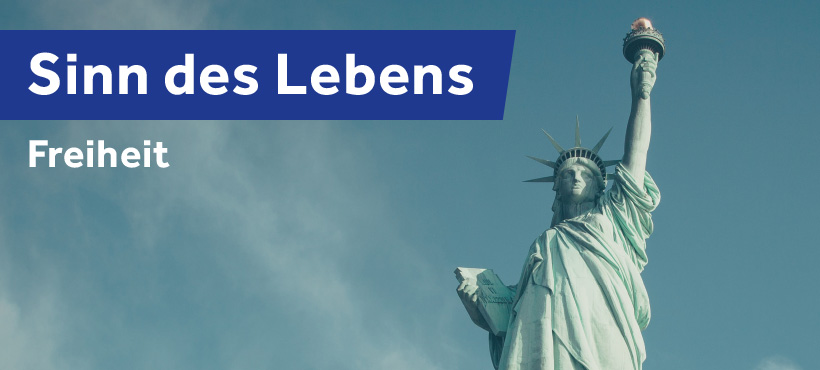The meaning of life
- Freedom
- Conference
Germans consider freedom to be the greatest good, ranking it above other important values such as justice, equality and security. “The meaning of politics is freedom”, according to Hannah Arendt. However, an increase in illiberal tendencies can be observed worldwide. Is an increasingly complex world prepared to accept restrictions on freedom? And how do we regulate the balancing of our freedom against the freedom of other people – including future generations, for example? What about our freedom of will and what does freedom mean for us and our lives?
The annual conference explores the topic of “freedom” from various perspectives and allows experts from the fields of philosophy, theology, psychology, neurology and politics to have their say.
Here you can download the current program flyer as a PDF file.
Program overview
10:00 a.m. – Walther Ziegler
Right to freedom or condemned to freedom?
11:30 a.m. – Hannah Monyer
Freedom and the brain
1:00 p.m – Lunch break
2:00 p.m. – Dieter Frey
Positive psychology and a free society
3:30 p.m. – Antonia Grunenberg
Why it is worth fighting for freedom
5:00 p.m. – Manfred Lütz
The meaning of life
Note: You can also book Manfred Lütz’s lecture as an individual ticket. You can find all the information here.
10:00 a.m. – Walther Ziegler
Right to freedom or condemned to freedom?
YouTube star Walther Ziegler takes the audience on a ride through the history of philosophy, starting with Pericles’ famous Athenian speech to the Enlightenment ideas of the American Declaration of Independence and the French Revolution through to modern and postmodern thinkers such as Hannah Arendt, Foucault, Habermas and Sartre.
Dr. Walther Ziegler is a philosopher and university lecturer and has worked as a foreign correspondent, reporter and filmmaker. His philosophy series Great Thinkers in 60 Minutes is extremely popular.
11:30 a.m. – Hannah Monyer
Freedom and the brain
Neuronal networks can reorganize themselves on a large scale as a result of intensive learning and environmental experiences – this is called neuroplasticity. This is based on a variety of adaptation mechanisms. What does this mean for our idea of freedom? Does it also adapt to our circumstances and opportunities, and if so, isn’t freedom possible for everyone in every situation?
Prof. Dr. Hannah Monyer is Medical Director of the Department of Clinical Neurobiology at Heidelberg University Hospital. She was awarded the Gottfried Wilhelm Leibniz Prize in 2004. The Ingenious Memory (with Martin Gessmann) was published in 2017.
2:00 p.m. – Dieter Frey
Positive psychology and a free society
In contrast to clinical psychology, which is usually deficit-oriented, positive psychology focuses on the positive aspects of being human. For example, the focus is on happiness, optimism, trust, individual strengths, forgiveness and solidarity. The term now refers to a separate school within psychology. Dieter Frey explores what can be done to shape an open and free society from the perspective of positive psychology.
Prof. Dr. Dieter Frey is head of the Center for Leadership and People Management at the Ludwig Maximilian University in Munich. He has been active for many years in science and business as a consultant and trainer on the topics of leadership, motivation, innovation and much more.
3:30 p.m. – Antonia Grunenberg
Why it is worth fighting for freedom
Are freedom and democracy in danger? We shouldn’t panic, but we should worry, says Antonia Grunenberg, because democracies are fragile constructs that “always have the potential to self-destruct”. If we want to preserve freedom and democracy, we need to leave room for debate and gaining knowledge, and we should ask ourselves how we can make a lively, open civil society so powerful that politicians cannot ignore or manipulate it.
Prof. Dr. Antonia Grunenberg is a member of the scientific commission of the Federal Foundation for the Reappraisal of the SED Dictatorship. She is the founder and director of the Hannah Arendt Center at the University of Oldenburg.
17:00 Uhr – Manfred Lütz
The meaning of life
You can explore the meaning of life philosophically or in religion, but how and where can you see it? Many people see it in the beauty of nature, they sense something divine in it. But if there were only nature and no people, there would be no one to see any meaning in the vastness of the universe. The highest expression of meaning, however, is art. And hardly any other place has attracted the world’s greatest artists as much as Rome. Lütz has known and loved this city for 50 years. As a student, he guided people through Rome to show them the meaning of life. Because in Rome, he is convinced, you can see the meaning of life.
Dr. Manfred Lütz is a psychiatrist, psychotherapist, theologian and cabaret artist.
Note: You can also book Manfred Lütz’s lecture as an individual ticket. You can find all the information here.

Ticket Prices (plus fees)
| Regular price | 34,90 € |
|---|---|
| Reduced price | 29,90 € |
| Member price | 24,90 € |
Box Office at a premium